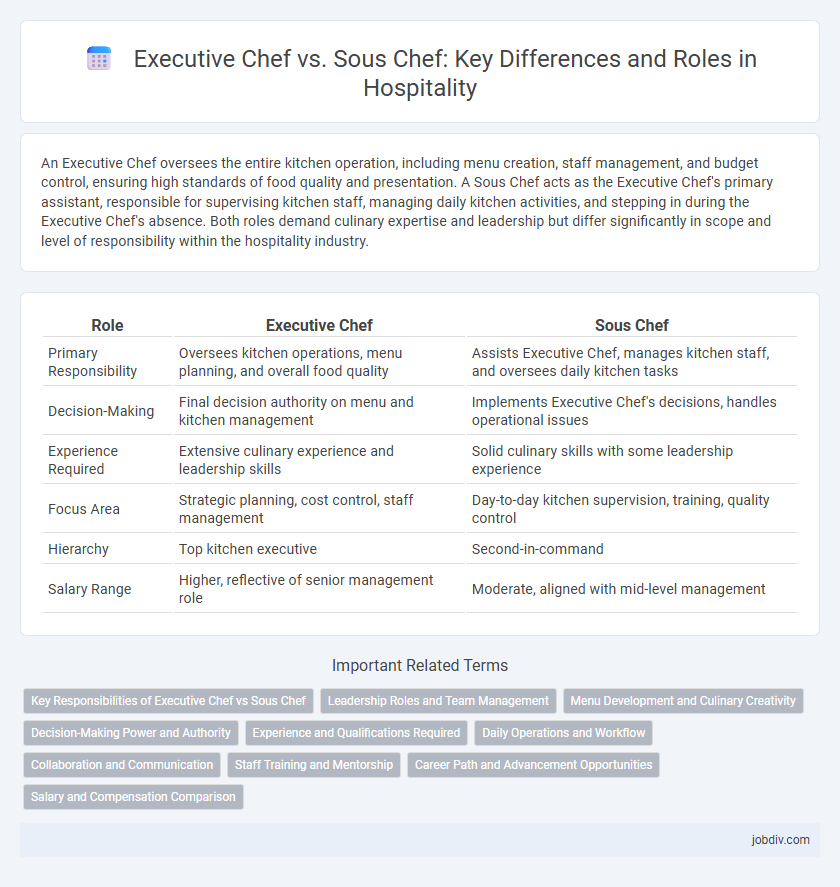An Executive Chef oversees the entire kitchen operation, including menu creation, staff management, and budget control, ensuring high standards of food quality and presentation. A Sous Chef acts as the Executive Chef's primary assistant, responsible for supervising kitchen staff, managing daily kitchen activities, and stepping in during the Executive Chef's absence. Both roles demand culinary expertise and leadership but differ significantly in scope and level of responsibility within the hospitality industry.
Table of Comparison
| Role | Executive Chef | Sous Chef |
|---|---|---|
| Primary Responsibility | Oversees kitchen operations, menu planning, and overall food quality | Assists Executive Chef, manages kitchen staff, and oversees daily kitchen tasks |
| Decision-Making | Final decision authority on menu and kitchen management | Implements Executive Chef's decisions, handles operational issues |
| Experience Required | Extensive culinary experience and leadership skills | Solid culinary skills with some leadership experience |
| Focus Area | Strategic planning, cost control, staff management | Day-to-day kitchen supervision, training, quality control |
| Hierarchy | Top kitchen executive | Second-in-command |
| Salary Range | Higher, reflective of senior management role | Moderate, aligned with mid-level management |
Key Responsibilities of Executive Chef vs Sous Chef
The Executive Chef oversees the entire kitchen operation, including menu creation, inventory management, staff supervision, and ensuring compliance with health and safety regulations. The Sous Chef acts as the Executive Chef's second-in-command, managing daily kitchen activities, coordinating food preparation, and directly supervising line cooks. While the Executive Chef focuses on strategic planning and culinary innovation, the Sous Chef handles operational execution and quality control during service.
Leadership Roles and Team Management
Executive Chefs hold the highest leadership role in the kitchen, overseeing menu creation, budgeting, and strategic planning while ensuring culinary standards and operational efficiency. Sous Chefs act as second-in-command, managing daily kitchen operations, supervising staff, and maintaining quality control in the Executive Chef's absence. Strong leadership skills and effective team management are critical for both positions to foster collaboration, motivate kitchen staff, and uphold service excellence in hospitality.
Menu Development and Culinary Creativity
The Executive Chef leads menu development with a strategic vision, crafting innovative dishes that align with the restaurant's brand and culinary trends. The Sous Chef supports this process by refining recipes, ensuring consistency, and experimenting with new ingredients to enhance creativity in the kitchen. Their collaboration drives a dynamic menu that balances creativity, cost control, and operational feasibility.
Decision-Making Power and Authority
The Executive Chef holds the highest decision-making power and authority in a kitchen, overseeing menu creation, budgeting, and staff management to ensure operational success. In contrast, the Sous Chef acts as the second-in-command, executing the Executive Chef's directives, managing kitchen staff during service, and handling daily operational decisions. The clear hierarchy establishes the Executive Chef as the strategic leader, while the Sous Chef operates with delegated authority to maintain kitchen efficiency.
Experience and Qualifications Required
An Executive Chef typically requires extensive culinary experience, often 8-10 years, with advanced qualifications such as a degree in culinary arts or hospitality management, and proven skills in kitchen leadership and menu development. A Sous Chef generally needs 4-6 years of experience, often possessing culinary certifications and strong proficiency in food preparation, kitchen operations, and team supervision. Both roles demand a deep understanding of food safety standards, but the Executive Chef prioritizes strategic planning and staff training, while the Sous Chef focuses on day-to-day kitchen execution.
Daily Operations and Workflow
Executive Chefs oversee daily kitchen operations, managing menu planning, inventory control, and staff supervision to ensure efficient workflow and high-quality food production. Sous Chefs assist by coordinating kitchen staff, maintaining food consistency, and stepping in to manage stations during peak periods, serving as the bridge between the Executive Chef and culinary team. Clear delegation of tasks between Executive and Sous Chefs streamlines kitchen productivity and maintains smooth operational flow.
Collaboration and Communication
Executive Chefs and Sous Chefs maintain seamless collaboration through clear, consistent communication to ensure kitchen efficiency and high-quality output. The Executive Chef directs overall menu planning and kitchen strategy, while the Sous Chef manages daily operations, translating leadership into actionable tasks. Effective communication between these roles fosters teamwork, timely problem-solving, and upholds culinary standards in fast-paced hospitality environments.
Staff Training and Mentorship
Executive Chefs establish comprehensive training programs to ensure culinary consistency and elevate kitchen standards, while Sous Chefs play a critical role in hands-on staff mentorship, guiding junior chefs through daily preparation and skill refinement. The Executive Chef's strategic oversight includes identifying talent development needs and implementing performance evaluations, whereas the Sous Chef focuses on fostering teamwork and operational efficiency during service. Both roles are essential for cultivating a skilled, cohesive kitchen brigade that upholds the establishment's culinary excellence.
Career Path and Advancement Opportunities
Executive Chefs hold the highest kitchen leadership role, focusing on menu creation, kitchen management, and overall culinary vision. Sous Chefs act as second-in-command, gaining hands-on experience in kitchen operations and team supervision, essential for advancing to an Executive Chef position. Career progression typically involves mastering sous chef responsibilities, developing leadership skills, and building a strong culinary portfolio to secure executive roles in upscale restaurants or hospitality groups.
Salary and Compensation Comparison
Executive Chefs typically earn a higher salary than Sous Chefs, reflecting their greater responsibilities in kitchen management and menu development. According to industry data, the average annual salary for an Executive Chef ranges from $65,000 to $100,000, while Sous Chefs earn between $40,000 and $60,000. Compensation packages for Executive Chefs often include bonuses, profit sharing, and benefits, highlighting their strategic role in hospitality operations.
Executive Chef vs Sous Chef Infographic

 jobdiv.com
jobdiv.com